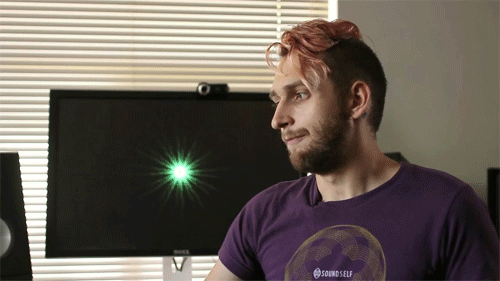GameLoading: Rise of the Indies
GameLoading: Rise of the Indies has issues in its decent documentary.
Reviewed by Daavpuke on May 01, 2015
Ever since Indie Game: The Movie cataloged the forerunners of the independent development golden age, people have been easily entertained by documentaries surrounding that topic. GameLoading: Rise of the Indies ironically sees us reconnect at the tail end of that spectrum. These people aren’t necessarily lone wolves building an empire for themselves. More so, this film takes place among a clique of individuals and their extended peers within the more modest, unkempt side of video games.
What GameLoading seeks to uncover is that there are many more layers in the indie scene than the few examples that bubble up. Projects can take on any form and this is hammered in throughout the feature, at times even resorting to playground antics. The quintessential example is The Stanley Parable, an effort in breaking conventional means of progression by redefining choice and impact. There’s also a part dedicated to developer Vlambeer, Cart Life and several other lauded items. So, humble, yes, but with its own clout still.

What makes GameLoading worth watching is that it does manage to cover a large scope. Game jam prototypes and eccentric genres get displayed. There’s also a good eye for history. Tying in bedroom coders from the past, we can see the classic pendulum swings that revive any topic. As they were then, so are we now. There’s also a big sense of community. A lot of people get to meet each other, hang out and basically just enjoy their shared interests. Despite having to fight for relevancy, the gang allows themselves to have an all-round, feel-good time. And yes, there is a struggle as well, as one person resorts to guerilla tactics to promote their baby. Cart Life’s creator breaks down the psychology of their game’s immersive effect. Old veterans discuss the legacy they’ve given the new generation. There’s so much that passes the bill here and with few means to actually go on. It almost sounds punk rock.
The above is a condensed form of the documentary’s success. Unfortunately, that’s not what sticks to memory the easiest. In fact, any information is hard to remember because GameLoading goes over so many snippets, it’s hard to all take in. If that were the only issue, however, it wouldn’t be so bad.
After a few scenes, it becomes apparent that the main focus, the people in the film, are rarely presented in a meaningful way. Polygon’s Ben Kuchera redundantly chimes in to state the obvious or to make a ridiculous paper plane metaphor. All developers are sort of goofy, don’t know what to do, all are sort of explorative. Most of the set pieces are put up to be superficial, even to the point of glossing over cancer. Their games are different and that’s different, because they’re different. It circles to those same flats over and over.

Granted, with so many topics to breach, it’s hard to give more than a few minutes to any subject, but the ones the movie does drill into are hit and miss. Vlambeer’s history; that’s a strike. The explanation of the ramifications of commercial success; that’s great. Having reiterated for the fifth time that games can be more than what we know; that gets stale. Hearing that sand-kicking, low self-esteem, combative positivity from yet another face; it becomes white noise. Indie developers are sort of the nerds among the nerds though, so their awkwardness can be taken at face value.
All those little foibles add up, but they’re not so bad. They’re not so bad. Hey, it’s indie development; no need to be so serious. Where else would you see such wackiness? If only that were true. If only GameLoading simply portrayed these banal geeks because that’s just who they are. The reality is that this placating attitude often feels more like keeping the viewer contented, while carefully boosting the product on display. Often times, it seems like the game’s allure is more important than the person behind it speaking talky words. Isn’t Armello great? That one dude did a thing for it. Pick it up, maybe. An hour in, faces and their story become a blur, but the game’s merits, those are still freshly put out there. Advertising isn’t done in an obvious nor obnoxious way, but it does seem like the game is the real eye-catcher, above what’s actually in the movie’s forefront. And even that, even that could be forgiven, were it done as a fluke. But it’s not a fluke.
It takes up to the very last moments of GameLoading to realize that it’s all a catered effort. It should be, since that’s how documentaries are made, with a theme. The first time there’s a hitch in the system is early on. Robin Arnott presents a pretentious idea for “a game, but it’s not really a game.” In short, Robin sells us Winamp. Robin whips their head with more velocity than a Mike Tyson victim, expressing the rest of the sentence with the dead enthusiasm of a PR rep: “Man,” a whip in tow: “Working in independent games right now, it feels like there's infinite potential in any direction.” Two polar opposites never followed up each other so quickly. The rest of the speech is laden with emotionless grimaces, while words seemingly go through a range, but the Burning Man hippy isn’t a good actor, unless they were going for flagrant insincerity. Robin is a douchebag, pardon the vocabulary. It’s a damn off-putting scene that returns any time the Soundself developer is on screen. Soundself is the name of the Winamp game that isn’t a game, by the way. That just makes it Winamp.

This insincerity runs in the family. The second moment disconnect surfaces is a lot harder to swallow than just some lethargic boob. Zoe Quinn, one of the people behind Depression Quest, gets the spotlight. They do a marvelous job at explaining their game and why exactly it functions as it does. All seems to point towards a strong chapter.
Then, the tide turns. “I faced, like, harassment,” Quinn rightfully states, sitting there in their punk-as-buttons army jacket, talking on the topic of women's ongoing struggles in the gaming industry. A sudden sigh escapes. “God, do I want to say that?” Quinn stares off to the side, wistfully pondering out loud, because this is what people actually do; it’s not just for melodramatic plays that need to embellish an emotion in order paint a picture.
Quinn is a much better actor, but that makes this spiel so much more wrong than the other, transparent example. “Yeah, fuck it, I'm going to say it, because it's important!" The light sparkles back in their eyes, as a small smile grows triumphant. Flex a bicep; we did it! The developer mouths the rest of the sermon. Quinn stipulates the protest once more, now looking right into the camera, making sure the audience knows the line has been drawn in the sand, by Quinn. “I have to fight for them!”
Zoe Quinn has indeed faced a repugnant amount of adversity over movements like GamerGate and other, random psychos with beefs and no clear targets otherwise. But that’s not what this moment void of any genuine human feeling shows. This is all about them, kiddo. Zoe Quinn wants the world to know that they’re an exemplary fighter and despite their seemingly whimpering insecurity, the army jacket-sporting Valkyrie will stand up for what’s right! It’s an incomprehensibly vulgar scene, a self-championing over the bodies of Quinn’s own peers, who in this very same documentary expose the problem without making it about themselves.

The third and final moment of GameLoading’s careful marketing is found in the credits, believe it or not. Here, the other projects that have backed the documentary get to show a little reel. GameLoading: Rise of the Indies had not one, but two Kickstarter events to complete its effort. They’re just scraping by. Making the flick is a project of love, supporting love; it’s not a commercial enterprise. They need a crowd, a community to bond over this. Yet, having those who support the cause put up their images contradicts that whole camaraderie pitch. This trade of resources for space is, in no indirect manner, advertising pure and simple. Games rolling through the credits, of which there are many, are mostly not shown out of kindness and support for showing off the indie community, but because these were among one of the two Kickstarter backer pools. Is your game quirky? That’s cool, but it would be even better if you had some scratch to spare so we can show you off. In turn, the main games who already felt like ad chunks only become more separated as privileged subjects. There is nothing punk rock about that. In keeping up with that analogy, GameLoading is to indie game development what the Sex Pistols are to punk: a carefully marketed, capitalist flag riding the indie culture. It’s entertaining on a surface level, but what a bitter aftertaste that is when deconstructed.
GameLoading: Rise of the Indies is the antithesis to Indie Game: The Movie. Where the latter crafted a personal story about the rock stars in game development, this documentary shows a bit of every other aspect. In high school, these kids would’ve been the “losers” of the bunch and that’s ok. It’s ok to be a little screw up going on with big aspirations. That’s where this feature succeeds in showing tiny bits of everything with solid detail where necessary. Unfortunately, a consistent line of numbing nonchalance and insincerity make those shallow chapters a lot harder to digest. The outcome is a lot more bitter than the lighthearted onset. It’s doubtful this presentation will bring people closer to indie games.
Daav Valentaten, NoobFeed (@Daavpuke)
Editor, NoobFeed
Related News
No Data.

